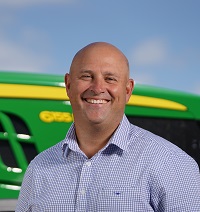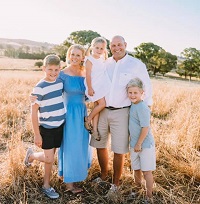Luke Chandler
Back on home soil
On the day we caught up with UNE alumnus Luke Chandler, parts of the United States were in the grip of a polar vortex and temperatures had dropped to a teeth-rattling -27 degrees. The new Australia and New Zealand managing director of the iconic machinery company John Deere was relishing the balmy climate of Brisbane and reflecting on a whirlwind few months.
For nine of the past 12 years Luke and his family have lived in the US or Europe, most recently in Moline, Illinois, where John Deere has its US headquarters and Luke was based as the company's chief economist. He, his wife Lizzie and three children returned to Australia from the US in October.
"It was an interesting time to relocate to the other side of the world," he says. "But we feel very lucky to be living in Queensland."
Although he had to Google where Moline was when first approached to work for John Deere in 2015, Luke says his family had a fantastic five years living in the mid-west. "We were the only Australians that we knew of in the state, but people were extremely welcoming and friendly," Luke says. "Professionally, it was an amazing opportunity to work out of the corporate office with all John Deere's senior leaders, travelling the world and learning about our global business.
"There were a few pinch-yourself moments, like flying into the Amazon and meeting with senior US political figures like [former vice president] Mike Pence. It was very different to how I grew up in country NSW."
Since studying Agricultural Economics at UNE, Luke's 25-year agribusiness career has seen him hold roles at the National Australia Bank, Australian Wheat Board and Rabobank. He's still in contact with former UNE classmates, many of whom have also become leaders in Australian agri-business.
"The degree provided a great foundation for learning," Luke says. "Throughout my career in analytics and economics, being the global head of commodity research for Rabobank and then chief economist for John Deere, I relied on the building blocks I learnt at UNE."
Luke says he has been proud to see, during his travels, how technology pioneered by Australian farmers (like the GPS technology and yield mapping developed in cotton and grains enterprises in NSW) is used around the world, particularly in precision agriculture.
"Australian farmers and the Australian agricultural industry are quite often ahead of the curve when it comes to innovation adoption, so it's exciting to be back and part of an industry that is world-leading," he says. "John Deere has a long history of partnering with Australian farmers and industry groups on technology and we all want to see the sector thrive."
Using his global insights to contribute to a more sustainable and profitable agriculture industry is now one of Luke's key goals.
"We have to be increasingly competitive on the world stage," he says. "Australian agriculture doesn't have safety nets, we export 60-70% of what we produce, and we don't have the huge domestic markets of the US or Europe. The opportunities are there, through precision agriculture and technology, and I can see John Deere playing a big role in helping the industry to achieve

those goals.
"Some of the technologies we are investing in, like using artificial intelligence to focus on weeds versus plants, can reduce input costs by to 80%. That means more money in farmers' pockets but also a significantly smaller environmental footprint. That's a real win-win scenario and I'm looking to continue that investment in Australian agriculture."
With ABARES reporting broad-acre farm incomes at record highs on the back of good seasons, bumper crops and high global commodity prices, Luke says confidence in the agricultural sector is buoyant. The next wave of technology, bringing automation into the hands of farmers, also promises to strengthen their position by resolving some pressing labour and capacity issues.
And although John Deere's yellow deer logo is synonymous with farming internationally, diversification is on the way, with company plans to develop the construction and forestry arms of its Australian and New Zealand business.
But, at least for now, Luke is simply happy to be closer to family. And he certainly won't miss the US weather. "The winters can be very cold and very long," he says. "The mid-west is very flat - amazing soils and farmland - but very exposed to the elements. You either get the winter snow storms or the spring/summer tornadoes rolling through. I'm very happy to be home."

